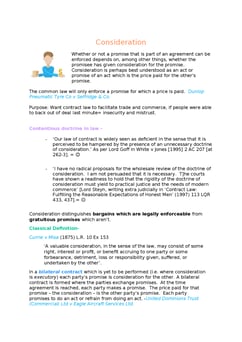Williams v Roffey Bros & Nicholls [1990] 1 All ER 512
Judgement for the case Williams v Roffey Bros & Nicholls
KEY POINTS
Traditionally, a promise to perform a pre-existing duty was not considered valid consideration, as it did not provide any additional benefit to the promisor.
However, the Court in this case took a different approach and considered the practical benefits that the defendants would receive by ensuring timely completion of the work, such as avoiding potential penalties, among others.
The court held that the defendants' promise to pay the additional sum of £10,300 was enforceable. The promise was found to be supported by valid consideration in the form of the practical benefits the defendants obtained by ensuring timely completion of the work.
FACTS
The plaintiff, a carpenter, entered into a contract with the defendants, building contractors, to provide carpentry work for the refurbishment of 27 flats in Twynholm Mansions. The contract was initially verbal but later replaced by a written subcontract, where the plaintiff agreed to perform carpentry work for a total price of £20,000.
The plaintiff started work in October 1985 and by April 1986 had completed the roof work and the first fix in all 27 flats and partially completed the second fix in 9 flats. Financial difficulties arose for the plaintiff due to the low agreed price and inadequate supervision of work.
The defendants, concerned about delays, promised an additional £10,300 to be paid at a rate of £575 for each completed flat, in addition to the contract sum of £20,000. The plaintiff continued work until the end of May 1986 when defendants ceased making payments. The defendants engaged other carpenters to complete the remaining work, incurring a penalty for the delay.
The plaintiff sued the defendants for the additional promised amount of £10,300, but the judge found in favour of the defendants, ruling that the plaintiff's version of the agreement was not credible. The defendants filed a counterclaim for damages due to the plaintiff's breach of contract for ceasing work prematurely.
JUDGMENT
Appeal dismissed. Promise to pay was deemed enforceable.
COMMENTARY
This case expanded the traditional approach to consideration and allowed for a more pragmatic view, considering the practical benefits and circumstances of the parties involved. It is now considered a significant authority in the area of contract law, particularly concerning the performance of pre-existing duties and the concept of valid consideration.
ORIGINAL ANALYSIS
Defendant had a building contract and subcontracted to Plaintiff. So as to avoid a late-completion penalty Defendant offered Plaintiff extra money per flat. It then failed to pay him the extra money.
CA said that there WAS a contract and Defendant had to pay.
It held that where one party paid additional money to another to complete an existing payment so as to gain a benefit or avoid a detriment, the advantage secured by the promise to make the additional payment was capable of constituting consideration, provided it was not obtained by economic duress or fraud.
In this case the commercial benefit of completing the work on time was considerable and definitely consideration.
Glidewell LJ
Distinguishes this from Stilk v Myrick by saying that that case was more about public policy and fears about lack of consideration (i.e. he adopts the “Espinasse report” approach to the case).
Hence in this ruling, the CA pointed out that there had to be some extra benefit gained/loss avoided in order for there to be consideration AND there had to be no fraud/duress.
Russel LJ
Also said that where a benefit is adduced, there is no reason why it should not be regarded as consideration.
----
The outcome is right since it would make no sense for the courts to curtail the way in which employers can pay and motivate employers. However the distinction with Stilk is unconvincing since they are materially the same circumstance. Under the test in this case, a modern court trying a Stilk type case would probably find for the sailor!
RELATED CASES
For Further Study on Williams v Roffey Bros & Nicholls

Contract law notes fully updated for recent exams at Oxford and Cambrid...
Need instant answers? Our AI exam tutor is here to help.
Ask questions 🙋 Get answers 📔 It's simple 👁️👄👁️
Our AI is educated by the highest scoring students across all subjects and schools. Join hundreds of your peers today.
Get StartedSimilar Cases
Related Product Samples
These product samples contain the same concepts we cover in this case.
| Contract Law | Consideration Pq Notes Notes (9 pages) |
| Contract Law | Consideration 1 Notes (16 pages) |
| Contract Law | Consideration And Estoppel Intention To Create Legal Relations Notes (22 pages) |

 Since 2010, Oxbridge Notes has been a trusted education marketplace, supplying high-quality materials from top achievers at universities like Oxford, Cambridge, LSE, Harvard, and Yale.
Since 2010, Oxbridge Notes has been a trusted education marketplace, supplying high-quality materials from top achievers at universities like Oxford, Cambridge, LSE, Harvard, and Yale.